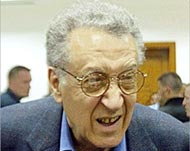Al-Akhdar al-Ibrahimi: Profile
The Algeria-born diplomat al-Akhdar al-Ibrahimi, 70, is said to be the man who can synchronise UN and US efforts to sort out the complicated problems in Iraq.

The universally esteemed diplomat won the confidence of former US President Bill Clinton when he served as UN senior administrator in Haiti in the mid-1990s, and of George Bush in Afghanistan where he successfully concluded a two-year term as the UN senior envoy to Kabul.
Al-Ibrahimi worked closely with the US ambassador to Afghanistan, Zalmay Khalilzad, in orchestrating successful US-UN collaboration in Kabul. His crowning moment was when he brokered an agreement among all ethnic and religious groups on a democratic constitution at the recently concluded grand council, or loya jirga, in Afghanistan.
His appointment as a senior adviser to the UN Secretary General, Kofi Annan, is seen as an attempt to bridge the gap between the UN and the US in a bid to point the way toward a similar achievement in Iraq.
Al-Ibrahimi’s distinguished negotiation skills have been tested in the harshest of circumstances when heading UN missions to hotspots such as Yemen, Liberia, Sudan, Nigeria, South Africa and the former Zaire (now the Democratic Republic of Congo).
 |
|
Brahimi has worked throughout |
Mediated Taif Accord
Al-Ibrahimi served as the Algerian minister of foreign affairs from 1991 to 1993 and as the under-secretary general of the Arab League from 1984 to 1991.
Highlights of his career include mediating the Taif Accord, which cemented the way for an end to the Lebanese civil war.
He was diplomatic adviser to President Chadli bin Jadid of Algeria from 1982 to 1984, ambassador to the United Kingdom, Egypt and Sudan, as well as the permanent representative to the Arab League in Cairo from 1963 to 1970.
Winner of the 2002 great negotiator award from the Harvard Law School, al-Ibrahimi oversaw the production of the al-Ibrahimi Report, a comprehensive analysis of the efficiency and effectiveness of UN peacekeeping missions.
He was also awarded Afghanistan’s highest decoration, the order of Ghazi Aman Allah Khan.
Well liked by the US, al-Ibrahimi was selected by Washington to play a leading role in Iraq.
“If he makes recommendations about elections then everyone – not just the United States – will listen to him,” a senior US official said in Washington following al-Ibrahimi’s talks with National Security Adviser Condoleezza Rice and Secretary of State Colin Powell on Iraq and Afghanistan in the White House on 22 January 2004.
Following a visit to Iraq in February 2004, al-Ibrahimi said the timing of Iraqi elections should not be held prisoner to any deadlines.
His comments angered some Iraqis who wanted to see swift and direct elections. But his assessment was welcomed by US and UN officials.